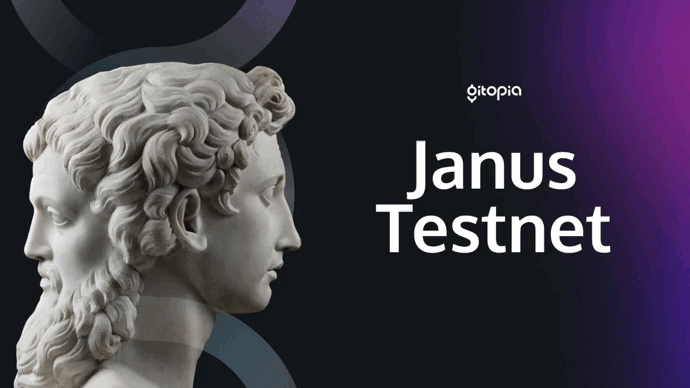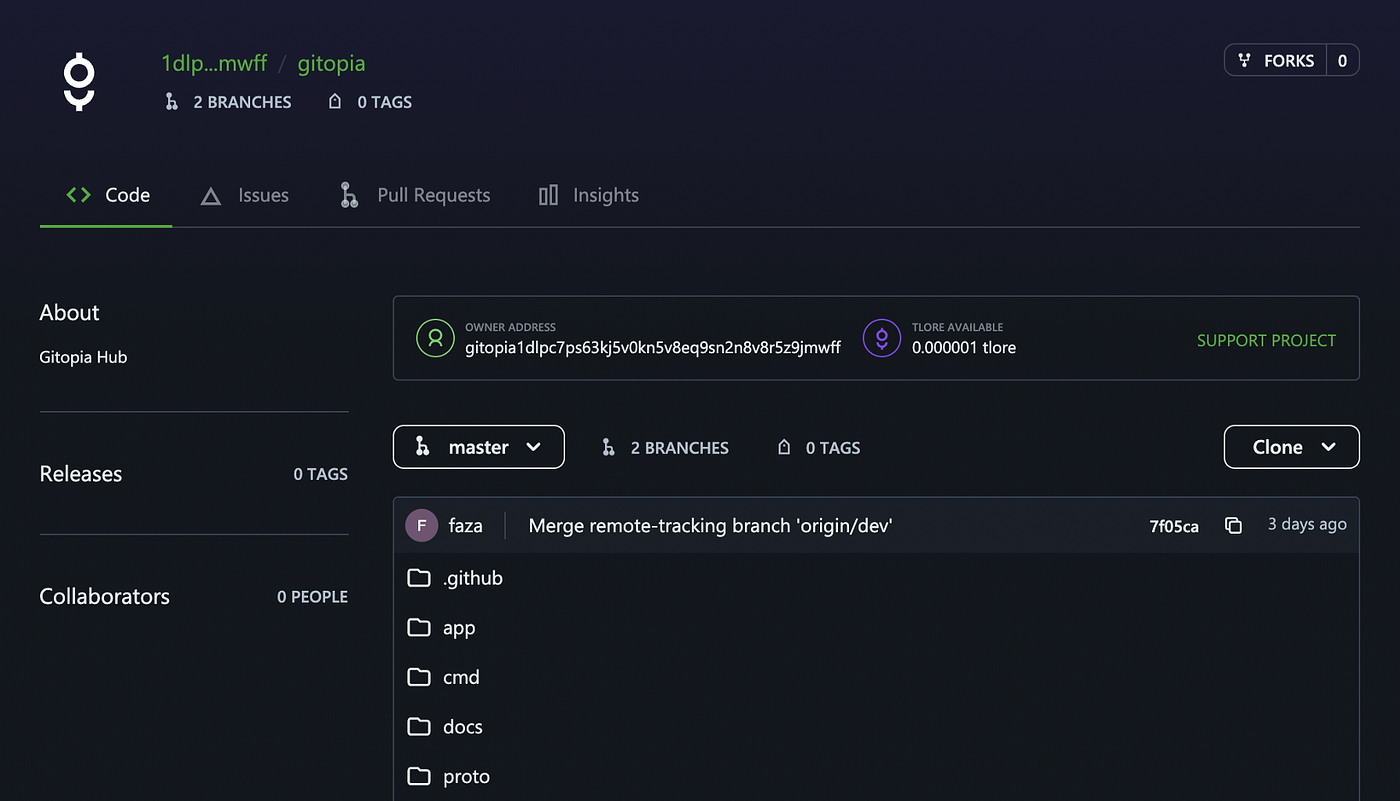
Gitopia Janus Incentivized Testnet
Add to Watchlist
Added to Watchlist
Reward pool
Not set
LORE
Expected profit
Unknown
LORE
Max participants
∞
No limit
DropsEarn score
Neutral
Normal, Low Risks
 Details
Details
The highlighting features getting released in the Janus Testnet are:
* Collaboration workflows - fork, pull request, merges, issue and diff* Releases — A workflow for shipping software to the end-user* DAO at Gitopia — A one-click solution to create actionable value-driven DAOs for your opensource and #web3 projects* Ledger Hardware Wallet and Keplr Wallet Extension support

Shortly after Janus testnet launch, will be announced details of an incentivization mechanism that has been designed to bootstrap the Gitopia Ecosystem and onboard early stakeholders such as validators, developers, and ecosystem partners to the platform. A significant portion of the genesis supply of Gitopia’s native token, LORE, will be distributed to the community via this incentivization mechanism.
Gitopia Janus Testnet
The Gitopia Janus Testnet heralds a new stage in Gitopia's evolution, featuring collaboration features that enable users to share and collaborate on code. Gitopia named the testnet after Janus — the Roman god of beginnings, transitions, and endings — because the team hopes it will encourage projects to move to Decentralized collaboration platforms, kickstarting the end of domination by Centralized code collaboration platforms and beginning of a Decentralized era.
With the Janus Testnet, Gitopia is introducing many new features that will make it easier for teams and organizations (DAO) to host their projects on Gitopia and efficiently collaborate on them with developers worldwide.
Collaborative Workflows

The primary purpose of a Code Collaboration Platform is to host your repositories and enable you to collaborate with other users on various projects. The first iteration of Gitopia's Testnet allowed users to do the former easily but lacked various functionalities to do the latter effectively.
This testnet helps fix this problem by introducing various collaborative workflows like Issues, Forks, Pull requests, and Diffs. These features will enable developers to collaborate with their teams worldwide seamlessly.
Issues
Issues are a great way to keep track of tasks, enhancements, and bugs for your projects. They're kind of like email — except they can be shared and discussed with the rest of your team. You can use Gitopia issues to plan work within teams and, for many other purposes, customize them to your needs and workflow. You can use Gitopia Issues to:
- Discuss the implementation of an idea.
- Track tasks and work status.
- Accept feature proposals, questions, support requests, or bug reports.
- Elaborate on code implementations.
Forks
A fork is a copy of a repository that you manage. Forking is a way of copying a project's repository and using it as a basis for your own project. Forks on Gitopia will allow developers to experiment with changes without affecting the original project. You also can fetch updates from or submit changes to the original repository with pull requests.
Pull Requests
A pull request (often shortened to PR) is a mechanism for submitting changes to the source code of a software project. It allows developers to submit changes to the repository of another project, intending to review and possibly integrate those changes into the original project's codebase.
Pull requests let you tell others about changes you've pushed to a branch in a repository on Gitopia. Once a pull request is opened, you can discuss and review the potential changes with collaborators and add follow-up commits before your changes are merged into the base branch. Pull Requests has its own section in every repository on Gitopia.
Diffs
Diff is the difference in changes between two commits or saved changes. Gitopia will let you optionally visualize code changes in a side-by-side or split view. This may help you grasp how code has evolved over time and can also help visualize your changes when working collaboratively.
When you use a pull request, you can see what will be changed in the repository by viewing the diff between the incoming request and the base repository.
Releases
One of the most important parts of the software development life cycle is delivering your software to those who use it. Introducing Releases, a workflow for shipping software to end-users.
Releases are packaged versions of your software, along with release notes and links to binary files that you can make available for a broader audience to download and use. You can think of it as a replacement for using downloads to provide software.
It is recommended to version or tag your releases with a changelog that reflects the breaking changes between releases. It gives you the ability to look back at a previous version of your software versus the latest release.
Why should you be an early adopter at Gitopia Janus Testnet?
Gitopia's mission is to create a new paradigm for open-source software development and decentralized collaboration where everyone is a stakeholder, innovators are rewarded, contributors are motivated, and users have power.
With the cutting-edge code collaboration platform, Gitopia offers unique incentives for every participant's contribution to the ecosystem. These incentives are appropriately aligned to motivate contributors and help drive up the innovation and growth of open-source software on the Gitopia platform while ensuring the smooth and efficient running of the ecosystem.
An important thing to note is that the major portion of the genesis distribution of LORE (Gitopia’s native utility token) will be distributed to the community through a crowd distribution model. This decision was taken in order to onboard more participants in the network ahead of the launch and also make sure that the early tokens go to the contributors who can help Gitopia ecosystem grow.
Gitopia will soon announce an incentivization mechanism on Janus Testnet for the community. The incentivization mechanism will hold rewards for Developers, Validators, DAOs, and Organizations to earn points which would later be converted to LORE on genesis.
If you are a Validator or DAO and want to be part of the early stages of Gitopia and the Janus Testnet, talk to the team by filling out these forms:
Along with the incentivization mechanism, there would be suits of different activities for the community to participate in and earn points for the genesis rewards.
To know how developers, validators, DAOs, and organizations can benefit from using Gitopia, check out the previous blog — Demystifying Gitopia Ecosystem.
More information on how to earn LORE tokens and detailed information about the various activities planned will be released in subsequent blogs.
 Links
Links
About
Gitopia is introducing the next milestone in Gitopia’s roadmap: Gitopia Janus Testnet. The Gitopia Janus Testnet will include a variety of features that will make hosting projects on Gitopia and collaborating on them with developers worldwide a lot easier. The reward mechanism will hold rewards in LORE tokens for validators, developers, and projects building the Web3 and Opensource ecosystem.
Activity Type
Date
15 Apr 2022 03:00(UTC+3) - 15 Jul 2022 03:00(UTC+3)
Registration
Closed
When Reward:
None
Event Status

